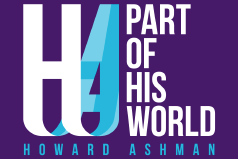How I Learned My Brother Was Gay
I’d like to think that forty years can change everything. Lately, though, I’ve been thinking about how things have and haven’t changed.
I didn’t figure my brother was gay when he dressed up as a Girl Scout for a Boy Scout Halloween party (the first and last Boy Scout party he ever attended). I just thought he was being terribly clever and besides, Milton Berle dressed up as women all the time – so no big deal.
I didn’t figure he was gay when it became clear that I rode a bike better than he did and that he applied my makeup better than I did.
And it wasn’t even the crap he took from the gym teacher for not being able to climb the ropes, or the teasing he got from boys on the block or the almost-as-difficult smothering he got from cooing moms.
First of all, I was three years younger and all I really knew was that Howard was talented, smart and my best protector, teacher and guide.
Also, by the time he was in high school he started dating girls.
And when he was in college he lived with a really nice and really sexy (even I could tell) woman named Maggie. So it was all a bit confusing.
Then one summer I found a letter. It was sitting – open I hasten to add – on the dining room table. This was 1972 or so. The letter was written to Howard from a girl – not Maggie – and it said something along the lines of, “I know you love Stuart and I understand and wish you much happiness…” You get the drift.
It was a Dear John letter written by a Jane after John had told her about Jack…or something along those lines.
The letter was sitting out for all to see but Mom was at work so I took the letter, folded it up and put it in Howard’s dresser drawer. It would be our little secret. Which it was because Howard never said anything and never asked about a missing letter.
Okay so big deal, I knew. It wasn’t exactly shocking, and in some way I think I was glad that I wouldn’t have to contend with a sister-in-law stealing Howard’s affections. Please remember that I was young myself and maybe not entirely clear on how affections worked.
Flash forward a few years. I have graduated from college and am planning to move to New York. Howard and Stuart are already living there in a studio apartment that consisted of a square room, minuscule kitchen and bath and a Murphy bed. I came for a visit one weekend and Howard sat me down for a chat. Stuart had run out on some important but unspecified errand.
“Now that you’re moving to New York,” my brother began, a little portentously and very seriously, “we have to talk about something…”
I waited.
“I know you’ve been around theater yourself,” he said, “and you have lots of friends like Kenny (my very sweet, very flaming college roommate) and…”
“You’re gay,” I said.
He looked so disappointed.
“You know?” he asked. “How did you know?”
I didn’t mention the Girl Scout costume or the gym teacher or the fact that he and Stuart had moved together to Indiana University and set up an apartment and life straight out of Barefoot In The Park. I just told him about the letter.
He didn’t remember leaving it out or even receiving it. But I think he was glad I had put it away when I did. Or maybe he wasn’t, because we spent the rest of the night talking about whether Mom knew.
So Howard came out to his family and gradually his sexuality was no longer an issue, nor much of an interest to anyone outside of Howard and his partners. Which was as it should be. And which was how it remained until Howard was diagnosed as HIV positive. Then once more the curtain was drawn.
What isn’t discussed much anymore, in the story of AIDS is the terrible isolation it brought. And the secrecy. Howard was afraid of losing his job and even I was sworn to secrecy – I too couldn’t tell the people I worked with why I was suddenly so angry and sad and taking such long phone calls from my brother. Howard was afraid to tell his own writing partner, Alan Menken for so long. We didn’t tell Mom until two years into his illness.
It wasn’t always because of fear of being ostracized – that was never a fear with Alan or Mom. Some of it was because of Howard’s relative fame and some of it was one final bid for privacy, for keeping ones own counsel. For not letting others have that last little piece of you. And some of it, I think, was the fact of losing everything because of a sexually transmitted disease.
Much has changed and it’s clearly for the better. But change for the better should never mean forgetting. Diagnosis with AIDS no longer is a death sentence. It is no longer to be hidden. That should never have been the case. But it was and to forget that is to dishonor far too many who were lost.
